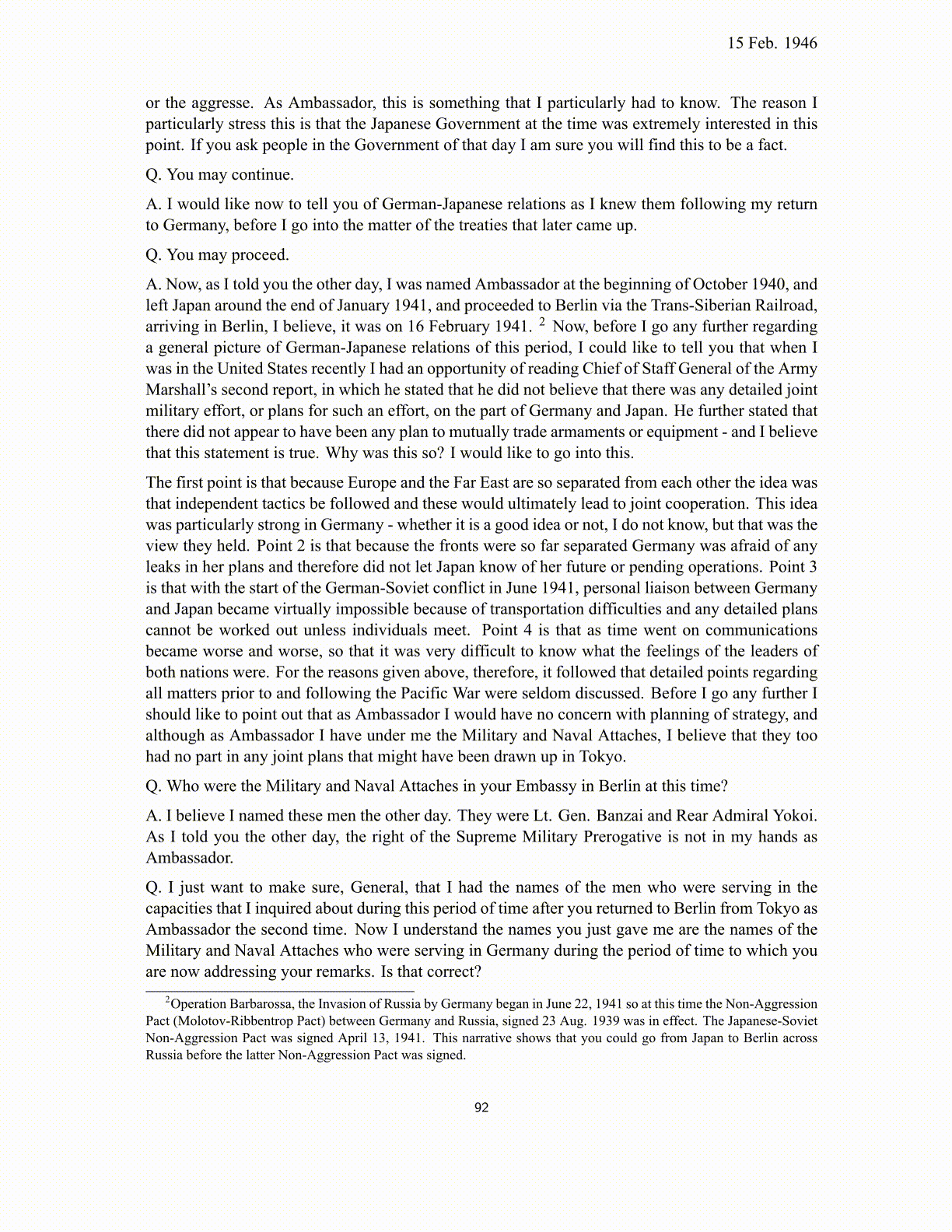
15 Feb. 1946 or the aggresse. As Ambassador, this is something that I particularly had to know. The reason I particularly stress this is that the Japanese Government at the time was extremely interested in this point. If you ask people in the Government of that day I am sure you will find this to be a fact. Q. You may continue. A. I would like now to tell you of German-Japanese relations as I knew them following my return to Germany, before I go into the matter of the treaties that later came up. Q. You may proceed. A. Now, as I told you the other day, I was named Ambassador at the beginning of October 1940, and left Japan around the end of January 1941, and proceeded to Berlin via the Trans-Siberian Railroad, arriving in Berlin, I believe, it was on 16 February 1941. 2 Now, before I go any further regarding a general picture of German-Japanese relations of this period, I could like to tell you that when I was in the United States recently I had an opportunity of reading Chief of Staff General of the Army Marshall’s second report, in which he stated that he did not believe that there was any detailed joint military effort, or plans for such an effort, on the part of Germany and Japan. He further stated that there did not appear to have been any plan to mutually trade armaments or equipment - and I believe that this statement is true. Why was this so? I would like to go into this. The first point is that because Europe and the Far East are so separated from each other the idea was that independent tactics be followed and these would ultimately lead to joint cooperation. This idea was particularly strong in Germany - whether it is a good idea or not, I do not know, but that was the view they held. Point 2 is that because the fronts were so far separated Germany was afraid of any leaks in her plans and therefore did not let Japan know of her future or pending operations. Point 3 is that with the start of the German-Soviet conflict in June 1941, personal liaison between Germany and Japan became virtually impossible because of transportation difficulties and any detailed plans cannot be worked out unless individuals meet. Point 4 is that as time went on communications became worse and worse, so that it was very difficult to know what the feelings of the leaders of both nations were. For the reasons given above, therefore, it followed that detailed points regarding all matters prior to and following the Pacific War were seldom discussed. Before I go any further I should like to point out that as Ambassador I would have no concern with planning of strategy, and although as Ambassador I have under me the Military and Naval Attaches, I believe that they too had no part in any joint plans that might have been drawn up in Tokyo. Q. Who were the Military and Naval Attaches in your Embassy in Berlin at this time? A. I believe I named these men the other day. They were Lt. Gen. Banzai and Rear Admiral Yokoi. As I told you the other day, the right of the Supreme Military Prerogative is not in my hands as Ambassador. Q. I just want to make sure, General, that I had the names of the men who were serving in the capacities that I inquired about during this period of time after you returned to Berlin from Tokyo as Ambassador the second time. Now I understand the names you just gave me are the names of the Military and Naval Attaches who were serving in Germany during the period of time to which you are now addressing your remarks. Is that correct? 2 Operation Barbarossa, the Invasion of Russia by Germany began in June 22, 1941 so at this time the Non-Aggression Pact (Molotov-Ribbentrop Pact) between Germany and Russia, signed 23 Aug. 1939 was in effect. The Japanese-Soviet Non-Aggression Pact was signed April 13, 1941. This narrative shows that you could go from Japan to Berlin across Russia before the latter Non-Aggression Pact was signed. 92